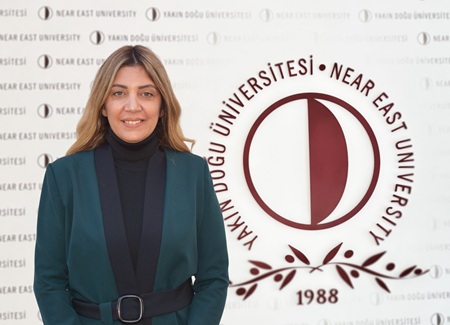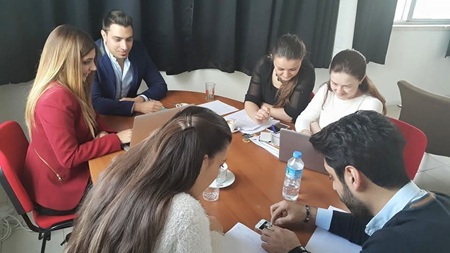
“The ability of information technologies to touch every aspect of life motivated me to explore this field deeply and contribute to it.”

How would you define the field of science you work in? How did you decide to pursue this field? What was the most influential person or event in the beginning of your academic journey?
I would define my field of study as “Information Technologies and Educational Technologies.” This area encompasses the integration of technology into educational processes, the development and application of innovative digital tools and methods to improve learning and teaching experiences. Educational technologies aim to facilitate access to information, make learning processes more effective and personalized, and support a broader vision that includes increasing digital literacy and promoting lifelong learning.
My decision to progress in this field was shaped by both personal interests and the curiosity and passion sparked by the era I lived in. Born in 1982, I witnessed the transition from the analog world to the digital revolution. During my childhood, analog tools like radios and cassette players were part of daily life, while in my youth, digital technologies began to spread rapidly, which fascinated me. The ability of information technologies to touch every aspect of life fueled my desire to delve deeper into this field and contribute to it.
One of the most influential figures in my personal journey was my father, who had a great interest in technology. Through him, I was introduced to the primitive technologies of the time, such as green screen computers, at an early age. Additionally, my computer teacher in high school encouraged and mentored me, increasing my motivation to pursue this field. He became a role model who inspired me with his knowledge and vision. Furthermore, my interest in programming before entering university led me to start experimenting with software on my own, using various books and resources.
This passion and interest guided my academic journey. Today, I continue to contribute to the field by examining both the opportunities provided by technology and the transformation it brings to education. Seeing how technology can change human life has always been a motivating factor, and I am driven by this motivation in my academic work.
“I am working to support individual learning paths with artificial intelligence and make educational processes more efficient.”

Can you tell us about the projects you are currently working on or your future research goals?
The interdisciplinary nature of information technologies offers opportunities to work on different projects, allowing me to conduct in-depth research in various areas of interest. Currently, I am focused on two main topics. First, I am working on the integration of artificial intelligence into the processes of assessment in education and project-based learning approaches. I believe that artificial intelligence has great potential to support individual learning paths, make processes more efficient, and drive the transformation of universities. In this context, my goal is to contribute to the management of sustainable educational processes with AI-powered systems and develop innovative solutions in this area.
Secondly, I am researching the critical role of soft skills in the workplace within the information technology sector, and how these skills are developed among IT students. Soft skills, such as communication, problem-solving, teamwork, and leadership, are essential for IT professionals to be successful in their careers. In my research, I evaluate students’ possession of these skills and aim to identify the most effective methods for developing them. My aim is to contribute to the development of well-rounded individuals who are not only highly skilled technically but also equipped with the competencies needed to meet the demands of the job market.
These two main research areas are centered around improving educational processes through information technologies and making the workforce in the IT sector more qualified. My work focuses on approaching technology in a human-centered way and managing these processes sustainably.
Additionally, I am conducting research on the use of digital currencies, De-Fi systems, and sustainability. These studies allow me to explore the potential of technology to offer innovative solutions in various domains.

Throughout my career, I believe I have made many valuable scientific contributions, but particularly my doctoral thesis and my research on mobile learning are among the ones I am most proud of, both academically and personally. My doctoral thesis focused on “Assessing the Perceptions and Competencies of Teachers and Students Regarding Mobile Learning.” In this study, together with my advisor and esteemed colleagues, we developed four different scientific scales for mobile learning. These scales are still actively used internationally, even after many years. This research has become an important reference for the effective integration of technology in education. Moreover, the articles derived from this work were published in leading academic journals and had a significant impact on the scientific community. In particular, one article from this thesis received over 600 citations, demonstrating its substantial contribution to the literature.
In addition to my doctoral research, during my master’s program, I supervised a thesis that investigated the impact of mobile-supported learning activities on the academic success, lifelong learning, and mobile learning competencies of teacher candidates. This study clearly demonstrated the positive effects of integrating digital tools and mobile technologies into educational processes for teacher candidates. Specifically, we observed how mobile technologies enriched learning processes and enhanced individuals’ motivation to learn.
These two studies, which began with my doctoral thesis, revealed the transformative power of technology in education, both theoretically and practically. The results of our scale development work have guided international research in the field of mobile learning. On the other hand, our study on mobile-supported learning applied these theoretical foundations, allowing us to make a tangible impact.
These two contributions remain among the most significant achievements in my career, not only scientifically but also in terms of providing innovative solutions for the future of education. I believe that the effective use of technology in education has the potential to enhance lifelong learning skills, and I continue to develop new projects with this vision.
“My greatest dream is to ensure equal and quality educational opportunities for children worldwide.”

I definitely do not believe that being a woman in a field dominated by men like information technology is a disadvantage. Throughout my career, I have not faced any barriers due to my gender, as the institution I work at is highly sensitive to gender equality. This equality has opened the way for individuals to be recognized for their achievements and competencies, allowing me to progress in this field. Moreover, pioneering women in the field of information technology, such as Ada Lovelace and Radia Perlman, have shown how a woman can leave a strong mark in this field. Ada Lovelace, as the world’s first computer programmer, and Radia Perlman, with her revolutionary work in network engineering, have been among the figures who inspired me in my career.
Of course, there have been challenges, but these were more related to the development processes in the industry and the changing technologies. The rapid pace of change in information technologies has always required staying current and adapting to innovations. To overcome these challenges, I focused on continuous learning, research, and self-improvement. With this motivation, both as a woman and as an academic, I have been able to turn every challenge into an opportunity while shaping my career.
In conclusion, being a woman has not been a barrier to success in technology and information technology. Instead, it is a characteristic that brings a different perspective and sensitivity. Thanks to the opportunities provided by both my personal efforts and the institution I am part of, I continue to contribute to increasing the number of women in this field and inspiring future generations.

If there were no limits ahead of me, the biggest issue I would prioritize solving would be ensuring access to quality and equal educational opportunities for children worldwide. Achieving the goal of ensuring that everyone, regardless of age, has access to quality education is one of my greatest aspirations. I believe every child should have equal opportunities to reach their full potential. However, today, educational inequalities, especially in developing or underdeveloped regions, present a significant obstacle.
While many projects and studies are already underway in areas such as remote education and artificial intelligence, I observe that the opportunities provided by these initiatives are still not fully eliminating educational inequalities, and many of these projects target only a limited audience. Providing equal educational opportunities in education will not be possible solely through technological advancements but through the comprehensive application of these technologies to ensure every child can access them. Therefore, my priority would be to implement projects that can reach a wider audience, creating sustainable and large-scale impact. By leveraging the power of information technologies and artificial intelligence in education, I would like to offer accessible, high-quality, and personalized educational opportunities to children globally. These technologies can not only overcome geographical distances but also address social, economic, and physical barriers, making them a key tool in achieving educational equality.
Strengthening social justice and supporting every child’s educational journey in the best possible way would be a meaningful success for me. Managing such a project would be, I believe, the most valuable contribution I could make to global education, both individually and on a larger scale.

Prof. Dr. Fezile Özdamlı’s Biography
Prof. Dr. Fezile Özdamlı Işık completed her undergraduate studies in Computer Information Systems at Near East University in 2005. Subsequently, she earned her master’s degree (2007) and doctoral degree (2011) in Computer Education and Instructional Technologies at the same university. Beginning her academic career at Near East University, Özdamlı obtained the title of Assistant Professor in 2011, Associate Professor in 2014, and Full Professor in 2019. Concurrently, she holds important administrative roles such as the Department Chair of Management Information Systems and the Department Chair of Innovation and Knowledge Management.
Dr. Özdamlı has contributed significantly to educational technologies through numerous articles published in international peer-reviewed journals and presentations at international conferences. Her articles cover prominent topics in education technology, including mobile learning, online education, student perceptions, and teacher training.
Additionally, Prof. Dr. Fezile Özdamlı Işık has authored and contributed to national and international books and book chapters, sharing her expertise and knowledge in her field. Beyond her academic career, she actively engages in various interdisciplinary projects, contributing to advancements in her field and supporting ongoing developments.